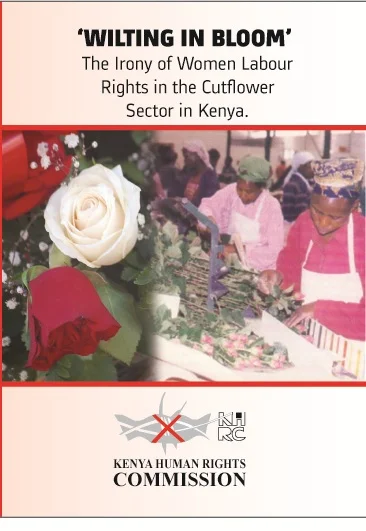“A female employee proceeding on maternity leave shall apply for the same and will be entitled to payment upon return to work with the dues being paid to the employee after working for one month” says the report quoting from some flower farm company policies. This contravenes the employment act which states, “A female employee shall be entitled to 90 days maternity leave without loss of benefits”.
The report titled, Wilting in Bloom: The Irony of Women Labour Rights in the Cutflower Sector in Kenya, established that this subtle discrimination begins to manifest itself through pre-employment pregnancy tests which are part of company practice. Further, some employees are forced to proceed on maternity leave 2 months before their due date; which in some cases results to women taking less than 2 months maternity leave after delivery. 20% of the flower companies in the study were found to apply this practice, thus violating women’s rights to time to recover after delivery and care for their newborn child. Requirements by Fairtrade companies recommend 6 weeks compulsory maternity leave post-delivery.
The Kenya Employment Act 2007 states that, “a female employee shall be entitled to 90 days maternity leave on giving 7 days notice and without loss of benefits. An employee proceeding on maternity leave may apply to take annual leave consecutively”.
The KHRC report also highlights the systematic replacement of women in certain departments in the flower industry that were traditionally women dominated due to the delicate handling required. During the study, some Companies admittedly volunteered information on their preference to employ men for jobs that have been traditionally segregated for women as women are proving too expensive to employ. Some workplaces have moved from 70% women to 50% women and still going down such as pack-houses. The state is obligated under ILO convention 183 to put in place measures that ensure that women do not get disadvantaged as a result of the increase in the maternity leave period.
Women, who play more reproductive roles than men, constitute the majority of employees at cut flower farms and of these, single -mother employees account for over 55% of the staff, according to the report. According to the report, women staff working in flower farms have an average of 3 children and leave them in ‘day care’ centres. During the study KHRC established that these so called ‘day care’ centres are unhygienic and unsuitable for human habitation, with reports of children suffering rickets and malnutrition while in such facilities.
Findings of the report show that the women with young children both single and married alike have no supportive social structure to care for their children, and such there is a proliferation of day care centres in the suburbs where workers live. Reporting time in most flower farms is between 7.00 and 7.30am and during peak hours the employees could work until 9:00pm.
“These ‘day care’ centres are mainly single roomed residences that are converted to be day care facilities during the day. Women leave their children in these facilities and are required to leave food and changes of clothes for the children during the day” states the report.
Facilities are the ‘day care’ centres are wanting, as the study found most of the toddlers are dropped with food which often goes bad during the day as there are no facilities to preserve or warm it. A visit to one of the day care facilities revealed that there were 20 children of different ages cramped in a 10”X10” room with only one wet bed available for all the children. The centre had two care givers who forced children to remain seated on the cold cement floor for hours on end.
In Naivasha, the study indicated that malnutrition and inability by some parents to provide food for the children was prevalent, as some care givers told researchers that it is not uncommon for women to leave their children without any food in these facilities.
The study was done in 15 farms located in Naivasha, Thika and Athi River and focused on 6 key areas namely: equal pay for equal work, maternity and paternity leave, child support, sexual harassment, dismissal, and casual labour and contracts”.
Further findings of the KHRC report indicate that women in the flower sector are “time-poor” and hardly invest in preventive or promotive health care let alone nurturing the family. Some employers argued that workers can use their one day off per week to visit the health facilities.
The report also reckons specific serious health and safety violations in certain farms such as spraying and burning of sulphur at night when workers are in their homes which close to the farms. High prevalence of oedema reported by women in pack-houses as a result of standing for a long work days without work breaks was also reported during the study.
In general wages in the sector, like other labour intensive driven sectors, are too low to cater for workers basic necessities of housing, food, healthcare, child education, childcare, transport, water and clothing.
The role of the Ministry of Labour is central to the realisation of women labour rights as the women of Kenya lack in mechanisms of accessing judicial means of enforcement. During the study, officer’s admitted the Ministry suffers poor “working environment in addition to inadequate staff, insufficient budgetary allocations, dilapidated and obsolete equipment and inadequate operational facilities, among other difficulties”.
However, the study showed marked improvement on prevention of sexual harassment in workplaces with 46 percent of respondents reporting policies in place to be adequate to protect workers.


